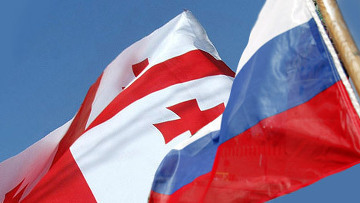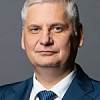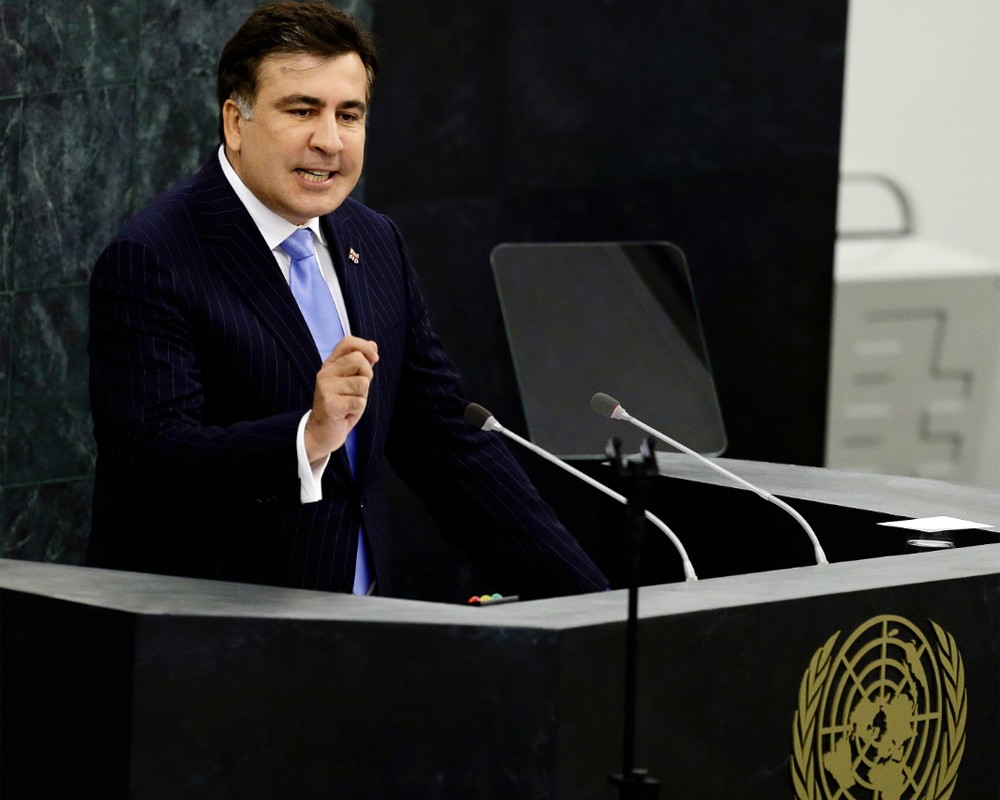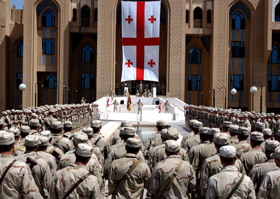Russia and Georgia: Normalization Without Setting Expectations Too High
Georgia's Prime Minister Bidzina Ivanishvili,
President-elect Georgy Margvelashvili
and Interior Minister Irakly Garibashvili attend
a news conference in Tbilisi, November, 2013
In
Login if you are already registered
(no votes) |
(0 votes) |
Ph.D in History, Leading Research Fellow at MGIMO University, Editor-in-Chief of International Analytics Magazine, RIAC Expert
The presidential election in Georgia, on October 27, 2013, had a significant impact on the internal political landscape in the country. Apart from determining its new head of state, the Caucasus republic will see constitutional changes come into effect that shift the balance of power between the key institutions of power in favor of the prime minister and the parliamentary majority, with the prime minister appointed together with his cabinet.
The presidential election in Georgia, on October 27, 2013, had a significant impact on the internal political landscape in the country. Apart from determining its new head of state, the Caucasus republic will see constitutional changes come into effect that shift the balance of power between the key institutions of power in favor of the prime minister and the parliamentary majority, with the prime minister appointed together with his cabinet.
However, whatever the outcome of this transition from being a presidential republic to the parliamentary model, there is little doubt that the Mikheil Saakashvili’s decade-long term in office, which started with the Rose Revolution in 2003, has come to an end. The outgoing Georgian president suffered his first tangible defeat in October 2012 when his United National Movement Party lost the parliamentary election to Bidzina Ivanishvili’s coalition of Georgian Dream and Democratic Georgia. In a year since then, the winner of the last year’s election has succeeded not only in creating a government of his followers and supporters but also in establishing control over the country’s security forces and diplomatic corps, leaving Saakashvili a lame duck president with curtailed powers.
Whatever the outcome of this transition from being a presidential republic to the parliamentary model, there is little doubt that the Mikheil Saakashvili’s decade-long term in office, which started with the Rose Revolution in 2003, has come to an end.
The 2013 presidential election was effectively a public vote of confidence for Bidzina Ivanishvili. It is remarkable that Giorgi Margvelashvili, the Georgian Dream candidate and the winner of the presidential electoral campaign, has until recently been virtually unknown to voters. People were less voting for him and more for the leader of the cabinet, who proved the only politician capable of defeating Mikheil Saakashvili. Following this electoral victory, the head of the Georgian government resigned and nominated Irakli Garibashvili, the 31-year old minister of the internal affairs, as prime minister. The future role of Bidzina Ivanishvili himself remains unclear. Whether he will become an “eminence grise” or wait until his followers’ practical failures make him even more popular, allowing him exclusive power, remains unclear.
And although there are no clear-cut answers to these questions, Saakashvili’s departure gives rise to hopes of changes in the country’s relations with Russia. These hopes are being reinforced, as one of the Georgian Dream’s key political messages was about normalizing relations with Russia. During his election campaign, Margvelashvili talked about the need to “cool” communications with Moscow. Are these hopes for an improvement at all realistic? And what are the possible constraints on normalization in practice?
Russia and Georgia: Rock Bottom?
Russia’s relations with Georgia today are at a lower ebb than its bilateral relations with any other former Soviet republic. Even the traditionally troublesome Baltic republics seem, by contrast with Georgia, almost a model of rationalism and pragmatism. Russia has not had even limited armed clashes with any of the newly independent post-Soviet states (involvement in peacekeeping or civil conflicts is a separate important topic). Diplomatic relations between Russia and Georgia were severed in September 2008, and for four years contact between the two countries remained limited. It took place within the framework of the Geneva negotiation process; during Russia’s accession to the WTO (through Swiss mediation); at the opening of the Kazbegi-Lars Checkpoint on the Georgian Military Road (with Armenian mediation); and during discussions on electricity projects (e.g., operations of the Inguri hydro power station).
To a great extent, it was all down to the foreign policies chosen by outgoing president Mikheil Saakashvili. The Rose Revolution leader announced that his priority objective was to “put Georgian territories back together.” He started by looking for an outside enemy to blame for the statehood failures in this Southern Caucasus republic. Post-Soviet Georgia’s liability for inter-ethnic conflicts in South Ossetia and Abkhazia was effectively shifted onto Russia, turning Georgia’s conflicts with Abkhazia and Ossetia into a Russian-Georgian conflict. The idea of “fleeing the Russian Empire” (with practically no distinction drawn between pre-revolutionary Russia, the USSR and the Russian Federation) became the political leitmotif of the elite and expert community in Georgia, a condition for the country’s liberalization and its integration into the community of “civilised nations” i.e. the Western world. Respectively, according to the ideologists of this “young” Georgian democracy, their only chance of winning this confrontation with Moscow would be if they opt for full-scale cooperation with the US, European countries and multilateral organizations (chiefly with NATO). It was assumed that this pro-Western choice will ensure internal stability in Georgia and pacify the mutinous republics that broke away in the early 1990s.
Russia’s relations with Georgia today are at a lower ebb than its bilateral relations with any other former Soviet republic.
But instead of bringing the expected integration into the “Western family,” these policies led to a resumption of armed clashes in South Ossetia, the breakdown of the negotiation process over the conflict with Abkhazia, and open confrontation with Russia. It culminated in the 5-day war of August 2008; the forfeiting of a number of territories that had hitherto remained under Tbilisi’s control (the Liakhvi Corridor and Akhalgori District in South Ossetia; Kodori Pass in Abkhazia), and the recognition of the two breakaway republics, formerly autonomous areas in Soviet Georgia. And although Abkhazia and South Ossetia have only been recognized by 5 UN member states (by contrast, the former Serbian autonomous area of Kosovo has been recognized by 106 states), it set a legal precedent, and with Russian military guarantees to the two de facto states the chance of them returning to Georgia seems rather remote.
In 2008, Tbilisi suffered a severe military and political defeat, and the country’s leadership clung to its tough course vis-à-vis Russia for four more years. Contact with North Caucasus nationalist movements was revived, and in May 2011 the Georgian parliament recognized the “genocide of the Ciscassians”; they also discussed recognizing other genocides (against Nakh people and the peoples of Dagestan). From the podia of multilateral organizations, Georgian delegates described their country as a “magnet” and a “democratic alternative” for all people of the Great Caucasus, promoting an idea of a “single free region”.
Georgia started to revisit its foreign policy toward Russia following the 2012 parliamentary election when control over the country’s supreme representative body and government shifted to the Georgian Dream coalition. The first direct dialogue between Russian and Georgian diplomats, after a long break, took place only after Bidzina Ivanishvili formed his government of Georgian Dream coalition members. Russia’s Deputy Foreign Minister, Grigory Karasin, met the Georgian prime minister’s special envoy, Zurab Abashidze on December 14, 2012 in Geneva. Then, on January 24, 2013, during the reception for Davos Economic Forum guests, Russian Prime Minister Dmitri Medvedev talked with his Georgian counterpart. This was the first communication between the heads of states since the August 2008 war.
Personality Factor or Systemic Issues?
Across the post-Soviet countries state power is extremely closely bound up with personalities. And although by 2012-2013, Mikheil Saakashvili’s role and significance in Georgian politics had diminished significantly, his status as the head of state effectively blocked any nascent attempts at normalization proclaimed by the Georgian Dream coalition. Suffice it to recall the speech by the third Georgian president at the UN in September 2013, which prompted the Russian delegation to leave the assembly room. Nevertheless, despite strong Saakashvili’s personal influence, bilateral ties or differences between the two countries should not be viewed solely through the prism of the personal relations between their leaders.
Numerous issues in relations between Russia and Georgia started building up back in the 1990s, and following the Rose Revolution the new Georgian authorities merely gave them a new impetus, exaggerating the difference between the West and Russia and ignoring the manifold interests that the US and NATO have in cooperation with Moscow. Today, the Russian Federation and Georgia remain divided by fundamental differences in their understanding of the future of Georgian statehood. The political class in the South Caucasus republic may vary in their attitudes towards Eduard Shevardnadze, Mikheil Saakashvili, or Bidzina Ivanishvili, while at the same time displaying unity in their approach to Abkhazia and South Ossetia. The Georgian Dream’s slogan for the two former Georgian autonomies was “Anything but Recognition”. During the election debates, the 2013 election campaign winner, Giorgi Margvelashvili talked about the need to continue the “non-recognition” policy (effectively, insisting that states and international organizations officially support the occupied territories status of Abkhazia ad South Ossetia).
Moscow, meanwhile, is not prepared to discuss the status of the two former Georgian autonomies, judging by the unambiguous statements in the Russian Foreign Ministry’s overview entitled “Key 2012 Foreign Policy Events”. This confrontation is a direct challenge to Moscow, which, if this policy of non-recognition continues, will be perceived as the ultimate culprit in the two ethno-political conflicts and as an occupying country, while Abkhazia and South Ossetia are fully deprived of their status as political actors.
There are, as a result, two very different political and legal realities. In one, there is a “territorially undivided Georgia” enjoying support from the US and its allies, while in the other there are three independent states of Georgia, Abkhazia and South Ossetia. It would be difficult, even for diplomatic geniuses, to find a point at which these opposing pictures of the South Caucasus could be reconciled. Besides, Bidzina Ivanishvili’s team has already made it known that they do not intend to give up their strategic cooperation with the West or integration with NATO and the European Union. Moreover, Tbilisi has plans to initial the Agreement of Association with the EU while the Georgian Dream coalition is in power. At the same time, Georgian troops in Afghanistan have suffered the highest number of casualties since they were deployed in the country as part of the NATO operation.
Demand for Normalization: Basic Reasons
There is still demand for the normalization of relations, notwithstanding all possible barriers. Where does it come from? It has several causes. First, Georgia has remained largely a rural country, although its agrarian economy has seen better days. During President Saakashvili’s term in office, the total agricultural production in the country shrank 29 percent. And while 50 percent of Georgians are involved in agricultural labor, this sector generates a meager 8 percent of GDP. Opening the Russian market to Georgian commodities would have a positive impact on the life of local residents.
Secondly, the diaspora is an important factor. Despite the absence of diplomatic relations, Russia has a large Georgian community that has provided considerable support to relatives in Georgia.
The third factor is religion. It is worth noting that the Moscow Patriarchy continues to regard Abkhazia and South Ossetia as canonical territories of the Georgian Orthodox Church, while Catholicos-Patriarch Ilia II remains one of the most popular public leaders in his country. The spiritual leader of the Georgian Orthodox Church, unlike his political counterparts, has met Russian President Vladimir Putin and made positive pronouncements of his political potential, expressing hopes for his help in resolving ethnic conflicts (1, 2). Besides, the Georgian clerical hierarchy remains highly skeptical of Western mass culture, and sees Russian ties as a counterbalance to these new-fangled fashions.
Fourthly, tensions on the North Caucasus border may make the argument for security cooperation very persuasive. It is no accident that Georgia’s Defense Minister Irakli Alasania, even during his visit to Washington, spoke in favor of collaboration in security for the forthcoming Olympic Games in Sochi, “despite the dire legacy of the 2008 armed conflict”.
Practical Recommendations
Over the past year, Moscow and Tbilisi have made some tentative steps toward transforming bilateral differences from a conflict of values into a conflict of interests. This is likely to be the maximum possible in today’s circumstances.
There is a serious gap between the fundamental differences between the two countries and their interest in seeing cooperation on the economy, culture and security. If one does not want a repeat of earlier failures to normalize the relationship, it is necessary to give up excessive expectations and rash predictions. Over the past year, Moscow and Tbilisi have made some tentative steps toward transforming bilateral differences from a conflict of values (an “empire” declaring war on a “young democracy”) into a conflict of interests. This is likely to be the maximum possible in today’s circumstances. It should become the priority. It would be extremely naïve to expect the new Tbilisi team to seek to join the Collective Security Treaty Organization or the Customs Union (in any case, the latter idea was publicly repudiated by 2013 election winner Giorgi Margvelashvili). Tbilisi can radically change its foreign policy only if Moscow were to rescind its recognition of Abkhazia and South Ossetia. However, for Russia, such a step would be fraught with serious repercussions undermining trust among its closest allies. It is also worth recalling that Georgian policy-makers tend to take cognizance of their voters who may not be prepared to recognize the latest geopolitical developments. Hence the exploitation of the NATO myth perceived as a counterbalance to their northern neighbor. However, it is possible to deepen the pragmatic trend which has picked up in the past year, both through the greater involvement of Georgian producers in Russian markets and through increasing Russia’s business presence in Georgia, which never went away completely, even after the 5-day war in 2008.

Gradual Normalization in the Offing
It is vital to start cooperating on security issues on the North Caucasus border since radical Islamists in hiding perceive Russia and Georgia as their strategic opponents while the resources the two countries have deployed to oppose this challenge are radically different. Moreover, this cooperation may also benefit the US (particularly after the Boston bombing) and the EU. Such cooperation should be associated with persistent efforts to raise awareness among the Abkhaz and South Ossetian partners to avoid unnecessary tension or fears about any change in policy. Importantly, the process of normalizing relations with Georgia will not lead to the withdrawal of recognition of the independence of Abkhazia and South Ossetia or to the cessation of military and economic cooperation with them. Russian-Georgian normalization should not be tied to the course of finding a resolution to the Georgian-Abkhazian and Georgian-Ossetian conflicts. If the Georgian Dream coalition team proves itself able to appreciate Russia’s role and significance in the region, the degree of the West’s involvement and their own country’s resources, there will be a chance to see contradictions disappearing gradually. With this approach, discussions between them will no longer be perceived as a potentially lethal threat to Georgian national interests.
(no votes) |
(0 votes) |






